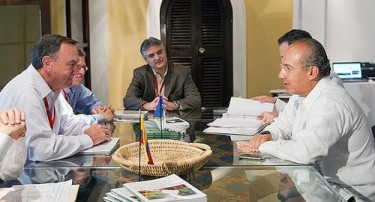
There have been better times to be associated with Wal-Mart. In 2011, for example, it was named in the top 10 most transparent corporations in Mexico [ES]. Yet one of the world’s largest corporations is taking a hit after evidence surfaced that their Mexican subsidiary paid US$24 million in bribes to Mexican officials between 2002 and 2005. According to an investigation by the New York Times, Wal-Mart has kept this information quiet since 2005, when a former employee in Mexico blew the whistle. Taking every opportunity to call out bad practices at the company, Wal-Mart reform advocacy and employee groups jumped on the scandal, calling on Wal-Mart’s CEO to resign in an online petition started by Organization United for Respect at Wal-Mart (Our Wal-Mart) on Change.org.
As the Foreign Corrupt Practices Act (FCPA) is more frequently enforced today than it has been for many years, attention now turns to how much Wal-Mart could be fined by US authorities. This is also likely to lead to questions concerning whether the bribes made a substantial contribution to Wal-Mart’s economic development, or whether profits were directly tied to the bribes
How the scandal played out in Mexico
A little more than a week prior to the New York Times report, the office of Mexican President Felipe Calderon released a photo of Calderon meeting with Wal-Mart CEO Michael T. Duke in Colombia. The Mexico bureau chief for McClatchy Newspapers, Tim Johnson writes in his blog:
“They probably wish they could recall the photo now.”
At that meeting, Calderon “congratulated Wal-Mart on its commitment to the environment by generating increasing amounts of clean energy” and praised the company for buying directly from Mexican farmers, his office said.
Duke, for his part, declared that “Mexico is an example for the rest of the chain worldwide” according to the statement.

Johnson writes that the president’s office issued a “bulletin” on April 23 that attempted to distance the federal government from the scandal by emphasizing that the bribery by was to local and state functionaries. Calderon didn’t become president until after the alleged bribery took place.
Mexfiles analyses what impact the Wal-Mart scandal could have on the upcoming presidential elections, noting that the PAN Party candidate, whose party controlled the federal government at the time of the bribery (and still does) had not commented on the issue. Meanwhile her two leading opponents were calling for investigations. Mexfiles also notes that the Calderon administration passed new anti-trust laws and wonders whether Wal-Mart’s aggressive bribery and expansion practices could be considered unfair competition against both big and small Mexican retail businesses pushed from the market:
One thing not well explained in foreign coverage of the Wal-Mart scandal is that Wal-Mart de México S.A.B. de C.V. consists of several smaller chains of supermarkets like Bodega Aurrerá and Superama, clothing shops like Suburbia, and VIPS restaurants. It has been argued that while some of these existing chains were fairly acquired others were subject to more hostile takeovers.
Culture of bribery?
Marco Antonio Gómez Lovera on Vivir Mexico [ES] is incensed that Wal-Mart executives in the United States and Mexico preferred to hide their knowledge of the bribery rather than investigate further and punish those responsible. Meanwhile, Mexfiles and other blogs [ES] opined that U.S. media and authorities may be downplaying the Mexican reaction due to a supposed “culture of bribery”.
For further information on the topic, please view the following publications from our partners:
Transparency International Bribe Payers Index, from Transparency International, Berlin, Germany.
Examining the Links Between Organized Crime and Corruption, from the Center for the Study of Democracy (CSD), Sofia, Bulgaria.
Global Anti-Corruption Efforts: The role of Non-Governmental Organizations, from the Centre for Applied Studies in International Negotiations (CASIN).
For more information on issues and events that shape our world please visit the ISN’s Security Watch and Editorial Plan.

